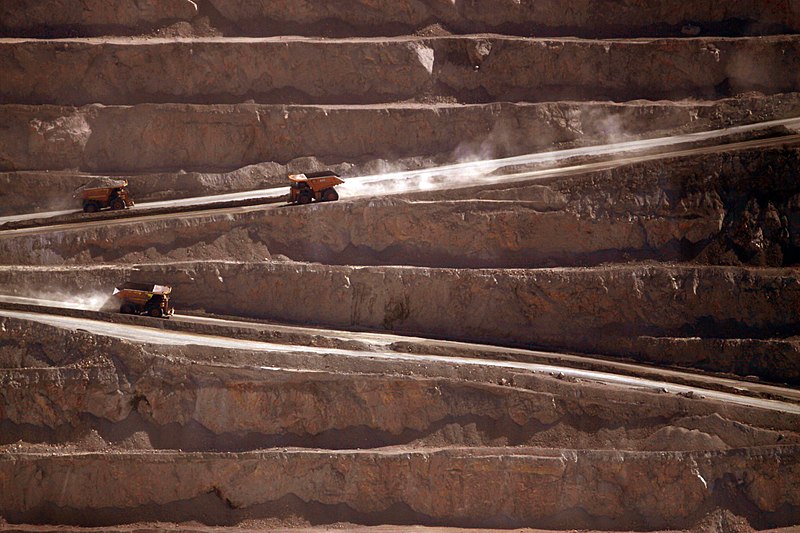Chile - a bright future for capital
by Dan Morgan
Chile is a very rich country but the people see little of the wealth. It has enormous natural resources, including huge reserves of copper and lithium, both essential for the transition to clean energy. The future is bright – but for whom?
COPPER INDUSTRY
In the case of copper, largely for transnational capital. Chile produces about 25% of the world total but the state company CODELCO accounts for only a third of that now.
CODELCO is the lasting legacy of Salvador Allende’s Popular Unity government. All the big mines were nationalised, along with an amendment to the constitution saying that all natural resources belonged to the State. Despite right-wing attempts to sabotage the decision, it was eventually passed unanimously in 1971. Such is the political support that even Pinochet’s neoliberal dictatorship did not attempt to change that. Instead, the stratagem was used of leasing mines to private capital, mainly transnational.
When a safe neoliberal democracy replaced the neoliberal dictatorship, transnationals felt confident enough to open mines in newer deposits. So now CODELCO is left with often old mines with declining returns, while many richer deposits are operated by firms with capital from the UK, Canada, US, Japan, Switzerland and so on.
The private companies say their effective tax rate is now 45%, including an additional royalty tax which was passed after being watered down by the right wing in Congress. Sounds high by the standards of modern capitalism, but mining is so profitable it is quite acceptable. The companies’ only concern is to get material out of the mines and export it. Refining, adding some value, is not the main concern of the transnationals so they export a lot of copper concentrate.
In 2020, 55% of copper exports were as concentrate, and this is expected to rise to 68% by 2030. Refining capacity has fallen in Chile and is not planned to increase. This is an economic and environmental crime – needlessly shipped across the Pacific to China and Japan, about 75% of the concentrate is rock and tax is only paid on the copper content, not on the gold and silver content which is also found in the ore.
Yes, they would argue that refining costs in Chile are several times more than in China. But this is because China has invested in new refineries – it has seven times more capacity now than in 2010. Chile’s enormous potential for solar energy in the Atacama desert, where most copper production take place, makes it ideal for energy-intensive industries like copper refining.
This is just another example of the lack of industrial policy, of a vision for national development. Successive governments have let transnationals do what suits them, and have not demanded investment in industry, let alone developed nationalised industries.
The biggest copper mine in the world is Escondida. It’s high in the Atacama Desert in the north of Chile, near the border with Argentina. It started up in 1990 and is owned by BHP, Rio Tinto and a Japanese company, JECO. BHP is the biggest mining company in the world, based in Australia but with British and US capital. The permanent workers recently went on strike during negotiations for the next three-year contract. It’s a good moment because the price of copper is at a high at four dollars a pound.
Each day of the strike cost the company 150 million dollars, so it lasted just 3 days. Among other benefits won were full private healthcare and no limit on redundancy payments, which under the law the company only has to pay for up to 11 years of service. The 2,400 workers got a bonus equivalent to £43,000 each. That’s 1% of what the firm distributes to shareholders, who will get around £10.3 billion this year. However, the ninety ton dumper truck drivers are already being replaced by autonomous driving.
So there is a sort of labour aristocracy, albeit that they have to work at high altitudes.
Last year, the average net income in Chile was about £12,000 though this figure is highly skewed by a few high salaries. The median wage was £8,600 for men and £7,200 for women. (1) Also, about 30% of workers are in the informal economy, usually with lower incomes.
LITHIUM
With lithium, the situation is better now. The government recently negotiated a deal with SQM, which had a contract to exploit the biggest salt lake until 2030. SQM, the producer of all Chilean nitrates and most lithium, was a state company until it was sold off to Pinochet’s son-in-law for a pittance. Now the state will get half the profit until 2030, and then 85%. Depending on the outcome of negotiations with European firms, there will possibly be some adding of value – the production of cathodes for batteries. A solid deal with a Chinese firm was excluded from this new contract and the Chinese firm is appealing the decision.
There is a lot of criticism on ‘extractivism’ both in Chile and in the West, but the only real opportunity for Chile is ‘extractivism to end extractivism’ to quote former President of Ecuador, Rafael Correa. Dialectical thinking. Industrialisation to add value and make that happen depends on having governments not under the political sway of imperialism. The same applies to the ecological impact of mining. The mitigation of those effects depends on the will of the State to regulate the mining companies or take control itself. Whatever the case, copper mining will be essential for the foreseeable future.
SUPERMARKETS
One of my first lectures on economics explained the idea of ‘price elasticity of demand’. If the price of a basic food, say milk, falls by 50%, are you likely to drink twice as much? No. So the elasticity is low. If the price of electric cars fell by 50%, sales would probably increase by several hundred percent – high elasticity. So supermarkets maximise their profits by keeping food prices prices high. Demand is inelastic, people have to eat whatever the price. In theory though, competition will keep prices at a ‘normal’ level.
Chile is known not as the land of the free, but as ‘the land of the three’. We have three owners of the main supermarket chains. Three chains of pharmacies, petrol stations, distributors of bottled gas (used by almost everyone), telephone services, producers of chicken, and just two of toilet paper. These are not technically monopolies, but oligopolies; it is easy for them to fix prices to keep them high. It is especially easy in Chile where the rich all live in the same small area of Santiago, just 3 of the 32 boroughs, and can contact each other with ease.
Some economists, even including some self-styled Marxists, discount the ability of oligopoly to fix prices but in Chile collusion to keep prices high has been discovered in several cases, including chicken, toilet paper, gas and pharmaceuticals. This produces a momentary scandal and even attempts to pay some compensation. In the case of supermarkets however, this has not been done.
I saw clearly that it operates in Santiago. About 22 years ago a supermarket opened two blocks from where we lived. The owner obviously had a different business model. The prices were always about 20 percent lower for almost everything. A litre of milk, for example, was 400 pesos, when everywhere else it was 500 pesos, or 500 instead of 600.
Of course, he started to sell huge quantities. From 2 check-outs he grew to 18 in the first year – only by word-of-mouth advertising. In the next 8 or so years he grew to own 12 supermarkets in the west and south of Santiago. Then he sold them all and presumably retired a wealthy man. The prices were immediately increased to match all the others. As a small business, he obviously could not negotiate lower prices from the producers or wholesalers, yet he was able to sell milk more cheaply. So it was clear that the big chains, in keeping their prices high, were getting monopoly profits. Of the 10 richest families in Chile, two own supermarket chains. They have made enough to invest in Argentina, Peru and Colombia. The biggest chain was bought by US company Walmart in 2009. The rest of the super-rich get their money from mining, forestry, banking and other finance.
CORRUPTION
The lid is being taken off another major case of corruption. The first big case was revealed in 2014. A disgruntled manager spilled the beans on illegal financing of politics on a massive scale. All main political parties other than the communists had been financed in a way that avoided paying tax for years. This included Allende’s Socialist Party, to its undying shame, and all those that had happily run the capitalist economy since 1990. The right wing parties had received most money of course.
This case ended with a few light sentences. Notoriously, the owners of the Penta financial group, who had been behind massive fraud, only had to pay a derisory fine and attend “ethics classes”.
Now there is another major trial on the horizon – we hope – after a leak of audio tapes made earlier this year. Luis Hermosilla, a very well-connected lawyer, is heard admitting that the bribery of Internal Tax Service staff, which they were planning, was a crime. Tax avoidance on a large scale has been revealed. The most interesting aspect is that Hermosilla is a close friend of a former Interior Minister, in turn a close friend of former President Piñera. WhatsApp messages from his phone, going back years, show the links between politicians and lawyers in deciding the promotions of prosecutors and judges, including for the Supreme Court.
A former prosecutor, commenting on these cases, says it adds pieces of the jigsaw puzzle left from the 2014 cases and explains why some prosecutors took strange decisions not to investigate the crimes properly. Public opinion, we hope, will demand that this present case be properly investigated.
RIGHT WING MOVES
Meanwhile we have our own case of lawfare, under a judge with clear political connections. Daniel Jadue, probably the most popular politician in the country, was in prison for three months and has now been released to house arrest. Jadue was the communist mayor of a poor borough of Santiago, who introduced a People’s Pharmacy to break the oligopoly, a People’s Optician, a bookshop where there had been none, a free People’s University, and municipal housing at low rents – a first for Chile. Jadue is charged with financial crimes relating to the management of the People’s Pharmacy in a case initiated by a supply company.
Gabriel Boric, our President, has forgotten all the anti-imperialist phrases he used in his youth and follows the US line on major foreign policy issues. He went to the farcical ‘summit’ on Ukraine, and was selected as one of the spokespeople to give the Ukraine regime slant. Now he is leading the outcry against Maduro’s re-election in Venezuela. All political parties in Chile support Boric, except the communists who issued a declaration supporting the sovereignty of States and opposing actions that would tend to increase polarisation there. It was carefully worded, as there is a lot of pressure to exclude the communists from the governing coalition.
The right wing in Congress here in Chile continues to block significant progressive reforms. With the government able to make little progress, the outlook for the municipal elections in October is not very hopeful.
(1) The exchange rate varies a lot but I have used the average for this year 1 pound = 1,200 pesos throughout

Escondida copper mine - Chile. photo by Municipalidad de Antofagasta

Self checkout at Walmart Chile. photo by Ostranation






